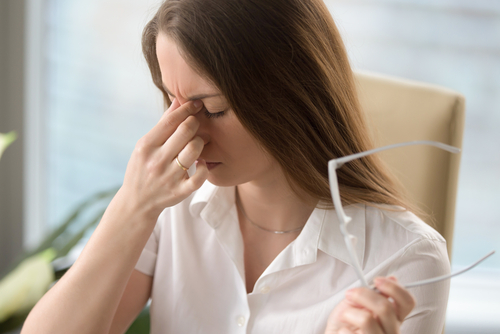Can I Avoid Dry, Itchy Eyes this Winter?

The dry winter air can mean dry, itchy, and irritated eyes. If you notice your eyes are made worse by situations indoors and outdoors during the cold weather months, there are ways you manage your discomfort and keep your eyes moist.
Keep reading to learn how you can avoid dry and itchy eyes this winter!
Drink More Water
Staying hydrated helps you and your eyes. You probably pay attention to how much water you’re drinking in the summer when you’re sweating and want to replace the water your body is losing.
Don’t put your water bottle away in winter! As cold weather approaches and you turn on the heat, your indoor environment gets drier.
This is true both at home and in the office. So keep a glass or water bottle handy and sip throughout the day.
Remember to Blink
How often do you pick up your phone, tablet, or laptop, thinking you’ll do a little work or browse social media, and suddenly an hour or more has gone by? You aren’t just losing time, you’re also losing moisture in your eyes when using a screen.
When you look at a computer or mobile device, you blink less. Blinking is the way your eyes stay lubricated and moist.
The eyelid carries a tear film across your eyes every time you blink, preserving moisture and reducing loss of lubrication. Blinking less dries out your eyes.
It’s important to deliberately blink for a few seconds when you are looking at a screen. Tie it to something that’s a part of your routine, like blinking twice each time you read to the end of a page or close a video tab.
Reduce Screen Time
While you may resist doing this, you may want to do an audit of how much time you spend on a screen. You’ll probably be surprised by the amount!
Even a reduction of fifteen minutes a day over your normal screen time is fifteen minutes that you’re helping your eyes. Think about ways you can cut back and preserve your eye’s lubrication.
Follow the 20/20/20 Rule
If you can’t cut back on computer time because it’s part of your job, try following the 20/20/20 rule. Set a timer to go off every 20 minutes, and when it sounds, look away from your screen at something 20 feet away, and do this for a count of 20 seconds.
Even though it takes less than a minute, it’ll give your eyes a rest from the up-close work, reducing the potential for eye irritation and discomfort.
Use Lubricating Eye Drops
Artificial tears are one way to keep your eyes moist and reduce discomfort. If you can, look for preservative-free eyedrops, as they’re a safer formulation.
Add these to your daily routine in winter, and your eyes will thank you for it. If you need more moisture, add it at bedtime using lubricating nighttime eye gels.
They’re thicker and stay in the eye longer, so you can add relief to your dry eyes while you sleep.
Add Omega 3 Fatty Acids
Eating fish like mackerel, wild salmon, sardines, and herring introduces essential omega-3 fatty acids into your diet. Your eye doctor may also recommend that you take omega-3 supplements.
Fish oils and flaxseed oils also contain omega-3 fatty acids and other key nutrients that support eye health. Try mixing fish or flaxseed oil into your favorite salad dressing.
Omega-3 fatty acids can help increase lubrication and combat your dry eye symptoms.
Get Professional Help
In some cases, these lifestyle changes may not adequately solve your dry eye symptoms. To get the best treatment regimen for your specific case, visit your eye doctor at Berg Feinfeild.
Are you experiencing dry eye symptoms? Schedule an appointment at Berg Feinfeild in Los Angeles, CA, today!








